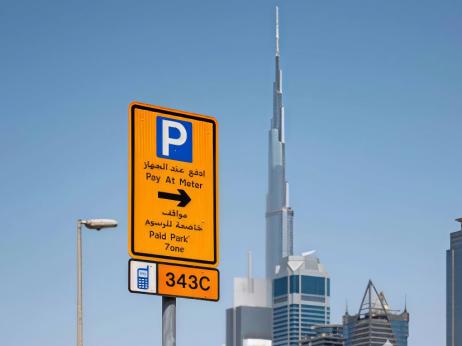The conventional car rental arrangement in Dubai required leaving a refundable security deposit, which could range from AED 1,000 to 3,000 and was meant to be blocked on your credit card for up to 30 days. That model is apparently going away fast by 2025. From competitive market pressure to digital payment innovation and tourism rebound, these three factors have driven rental companies to adjust.
“No deposit” should not mean “no control.” Instead of using your money to lock it, reliable companies, such as RentDrive.ae, combine intelligent software to automate pre-authorization, verified driver profiles, and real-time telematics, which allows them to manage risk without needing to block client funds.

What “No Deposit” Really Means
In Dubai, “no deposit” can mean three different things — and only one of them is genuinely risk-free.
| Type of “No Deposit” Option | How It Works | Real Risk Level | Typical Daily Rate (AED) |
| Insurance-Based | Higher daily rate includes full damage waiver; no block on card | Very Low | 170–250 |
| Card Pre-Authorization (Soft Hold) | Temporary hold (released automatically) | Moderate | 130–180 |
| Debit or Cash Alternative | Manual verification, often used by small local companies | High | 100–150 |
If the per-day rate seems suspiciously low, it often means the company makes up for it with hidden fees — “admin charges,” “traffic fine handling” or inflated fuel penalties.
Who Gains the Most From Deposit-Free Rentals?
- Short-Term Tourists (3–14 days):
They want flexibility, particularly with prepaid travel cards. No-deposit rentals get rid of frozen funds. - New Residents and Expats:
Most expats are new to the UAE and have no credit history or Emirates ID. A no-deposit renter can immediately drive after landing. - SMEs and Startups:
And for small businesses, cash flow is critical. Precluding many down payments for several cars is common sense from the operational side.
Are There Any Hidden Pitfalls?
Yes — and most of them are contractual rather than technical.
- Insurance Gaps:
Certain “zero deposit” offers might exclude windshield, tire or underbody damage. Always request a full damage waiver with an excess and be clear on the amount. - Traffic Fine Handling:
In Dubai, they’re put onto the vehicle itself as a fine is automatic. Unscrupulous agencies may add an additional “service fee” on top of their list prices. Always ask for the Genuine RTA proof. - Delayed Refunds:
Even if deposits are technically “not required,” small firms can impose a hidden retention fee or choose not to refund partial holds.
Good test: read the fine print of the contract for words like “admin”, “handling”, or “processing”. If you notice these words paired with “AED 100-300,” steer clear.
Comparison of Key Market Options (2025 Snapshot)
| Vehicle Type | Typical Daily Rate (AED) | Monthly Rate (AED) | Deposit Required? | Target User |
| Economy (Nissan Sunny, Kia Rio) | 130–180 | 1,900–2,400 | ❌ No (Insurance Included) | Tourists |
| Crossover (Mitsubishi ASX, Hyundai Tucson) | 200–300 | 2,800–3,800 | ❌ No | Expats |
| SUV / 7-Seater (Toyota Fortuner, Nissan X-Trail) | 350–500 | 4,500–6,000 | Optional Deposit | Families |
| Luxury (BMW 5 Series, Mercedes E-Class) | 550–900 | 8,000–12,000 | ✅ Required | Business Clients |
*Average from offers by major Dubai rental companies (Q3 2025).
Why Prices Differ So Much Among Companies
The Dubai rental market in 2025 is divided into three models:
- Aggregator Platforms (e.g., marketplaces): Focus primarily on price; they tend to display cars they do not actually own themselves.
- Traditional Agencies: Keep physical fleets and demand deposits plus administrative fees.
- Operational Companies like RentDrive.ae: Own and manage their fleet directly, using digital contracts and automated verification instead of cash deposits.
This third model provides customers with a clear, real-time pricing system —every dirham you pay is listed on your contract, and there are no hidden charges.
How to Check Out a No-Deposit Rental Before Booking
Before paying online or confirming through WhatsApp, follow this three-step check:
- Request to See the Original Contract:
A legit company will mail it to you in advance and every single clause can be seen. - Check if the Price Includes VAT, Insurance, and Mileage:
All-inclusive pricing is a hallmark of licensed Dubai rental companies. - Verify the Trade License (DED):
All legitimate ones display a DED-issued license on their website and office wall.
If any of those points are declined, it’s a fair chance that the offer is unregistered / gray-market.
Why RentDrive.ae Uses a Different Model
At RentDrive.ae, the “no deposit” policy is not marketing — it’s infrastructure. Every car in the fleet connects to a telematics system that automatically monitors mileage, speed limits, and schedules for servicing. This information replaces expensive withdrawals in cash with genuine accountability on both sides.
Customers get:
- Instant online booking and ID verification.
- Real-time rental extension via WhatsApp.
- All-inclusive insurance (including glass and tires).
- 24/7 support in English, Russian, and Arabic.
It appeals not only to tourists but also to locals and business users, whose time is more valuable than paperwork.
How Dubai’s Regulations Support Deposit-Free Rentals
Dubai’s Roads and Transport Authority (RTA) and the Department of Economy and Tourism (DET) clarified vehicle rental regulations since 2024. Companies which are licensed can now also issue digital verified contracts and connect insurance to Emirates ID numbers.
That framework made “no deposit” legally safe for both sides: the driver’s liability is insured, and the company’s assets are digitally protected.
Deposit-free renting is no longer an eccentric offering — it is the new normal for responsible, data-driven agencies. The key is transparency: you’re not shirking responsibility, you’re substituting legacy financial friction with technology and trust.
Book your car at RentDrive.ae — transparent terms, no deposit, and flexible packages designed for modern Dubai living.


